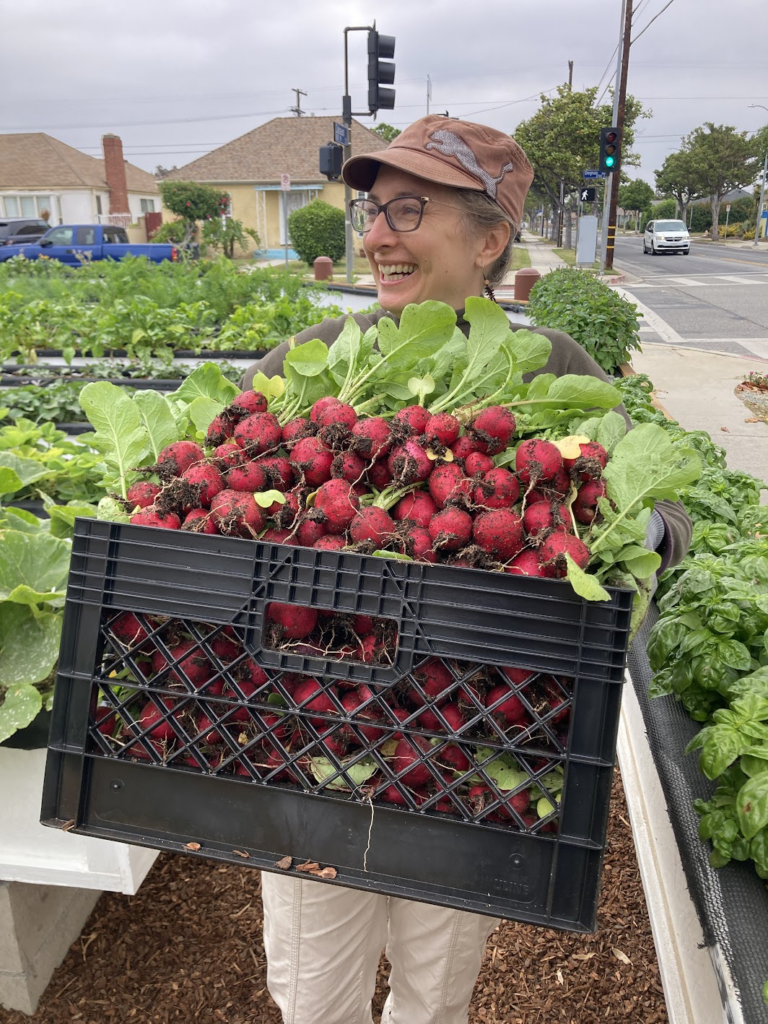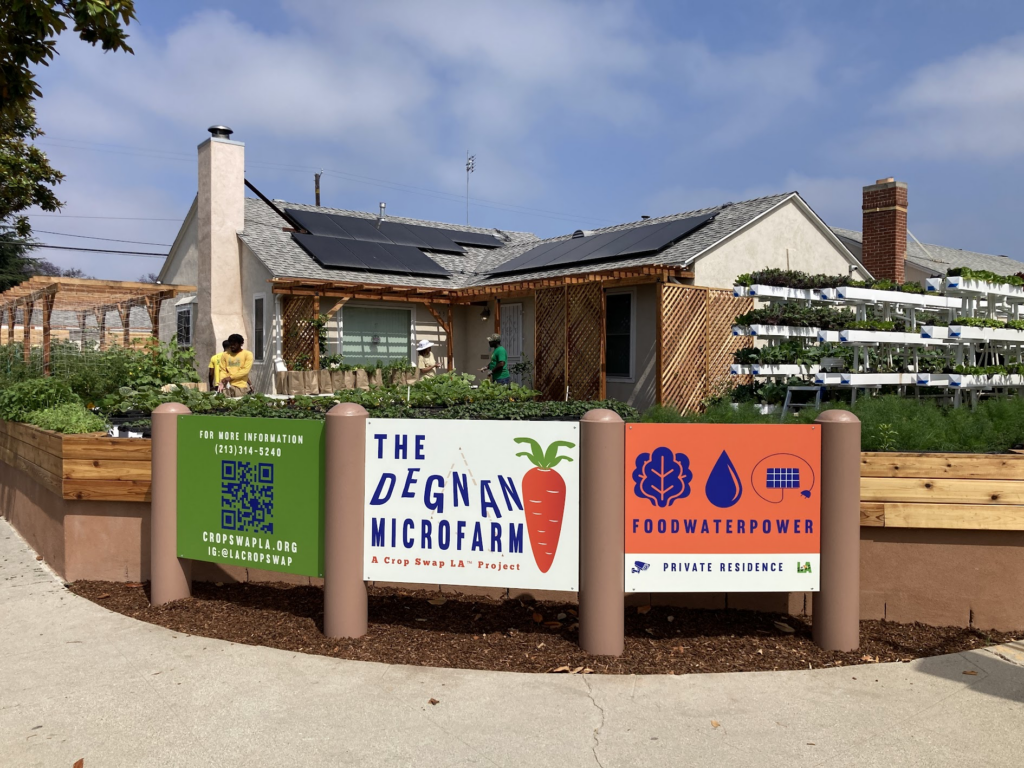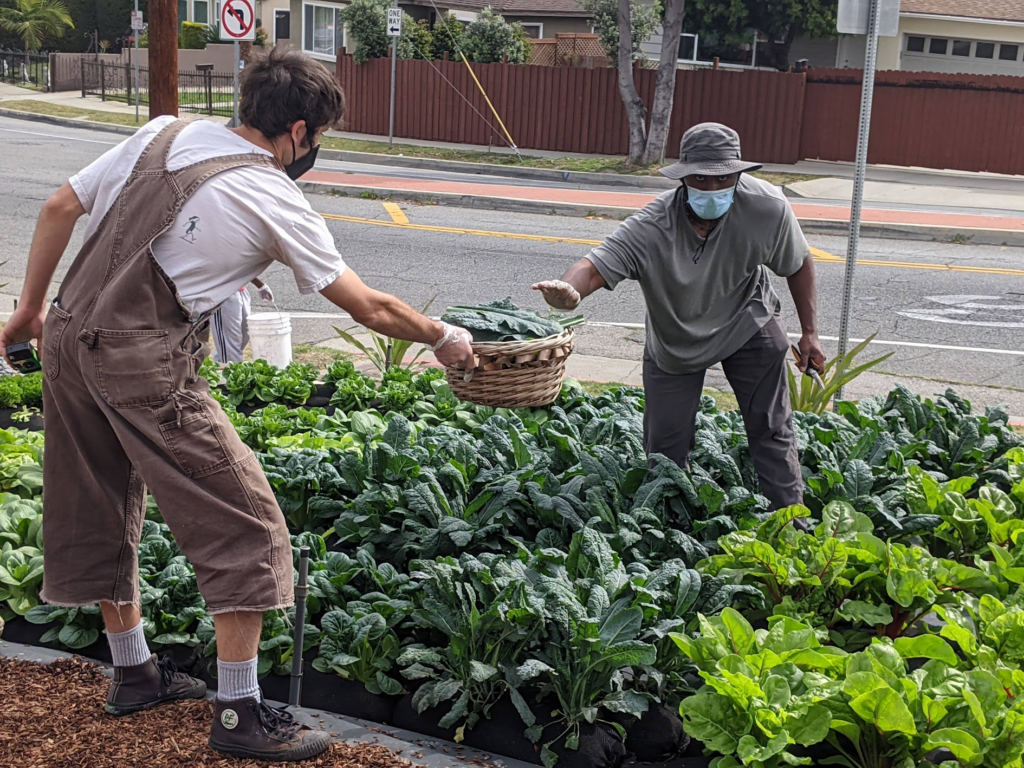Only a few places in the world have weather like Southern California. It is an ideal place to grow vegetables and fruits all year long. However, not all residents have the space to grow their own produce. Sadly, many residents in L.A. County face food insecurity, and others don’t have access to healthy food.
According to a study by USC Dornsife, over 1 million residents across the county are food insecure. South Los Angeles, for example, has one of the highest rates of food insecurity, where 1 in 4 people don’t know if they will have a next meal.
Through urban farming, Crop Swap LA has addressed food insecurity and promoted food justice in South L.A. for the past five years. The goal is that families in the neighborhood have access to healthy produce while creating a sustainable food supply chain that better serves the needs of the local residents.

How does it work? growing nutritious produce in the neighborhood’s backyards and unused land for the community, where local residents, particularly children, can see their food being grown and interact with its cultivator.
“Watching a 10-year-old that has never thought about where food comes from. You know, open a bag of chips but not think about that potatoes were grown to do that and all the process. I think of this one boy who participated in one of our after-school programs and how it just opened up a whole world for him. It’s a powerful connection,” said John Garside, Crop Swap LA Director of Policy and Development.
John said the boy went to his church and asked his pastor if they could plant their own garden in the back of the church. “He found his passion in putting a garden space and a couple of planter boxes. I think it can’t be overstated. It’s really powerful.”
The Food Diplomat- Jamiah Hargins: The future is now
United Way of Greater Los Angeles proudly awarded Crop Swap LA with funding through its 2022-2023 Community Care and Power funding opportunity, which sparked a new neighborhood-level effort at UWGLA. Its goal is to ensure every neighborhood has the systems, spaces, and resources to create its own solutions to the crisis and build shared prosperity. And it is, ultimately, forming a network of connected communities into an eco-system that powers a new regenerative economy for Los Angeles.
“It’s wonderful to have organizations like United Way that share those values and combine that with some of the public support, public programming. We’ve had some great champions in the state legislature and locally as well,” Garside side.
Crop Swap LA’s Innovation
Each micro-farm is equipped with a rainwater-capturing reservoir and water recycling system for its irrigation, which restores soil and water quality while greatly reducing reliance on municipal sources.
The grant from United Way L.A. partially supported the construction of the organization’s newest farm, ‘the Degnan’, paying for contractor fees (excavation, solar installation, gutter replacement) along with planting and irrigation supplies. This new farm features the organization’s largest water reservoir to date, holding nearly 10,000 gallons of rainwater, which will be used to irrigate over 6,000 plants.
Crop Swap LA believes that the expansion of a rain harvesting system will allow private and public landowners the opportunity to store a minimum of 5,000 gallons of fresh water to be leveraged in times of emergency.

Crop Swap LA’s Community Impact
Crop Swap LA microfarm’s network includes five farms and three main urban farms, which has allowed it to triple the size of its community-supported agriculture (CSA) membership service to over 100 subscribers, making zero-carbon weekly deliveries of produce bags to residents that live within 1 mile of its three urban farms. These bags average over 3 lbs of freshly harvested, nutrient-dense fruits and vegetables, with members paying half the market cost.
The organization also became a certified vendor for CalFresh/EBT, reducing the barrier to economic access to quality food. Through fundraising and market match programs, the organization is able to offer CalFresh members a half-off rate of only $25/mo.
The organization has also committed to donating at least 10% of its harvest, regularly contributing to senior centers, food banks, and other community-based organizations such as Good Shepherd Manor and Second Harvest Food Bank. It also collaborates with Los Angeles Unified School District on a local farm-to-school program.
“We’ve been working more closely with schools to do after-school programming and building gardens and green spaces. Our next farm is actually going to be at Dorsey High School. We’re really excited about that one,” Garside said.
Crop Swap LA’s Community Care
Crop Swap LA also offers employment opportunities for local residents to work in the micro-farms. It is actively developing an urban farming certificate program and creating internship opportunities and other workforce development efforts. It currently employs 21 full-time employees to run its operations and is committed to paying equitable wages while gradually and sustainably expanding its services.
“We have been dedicated to paying fair and equitable wages to farmers. We’re really just trying to right a lot of the wrongs with our conventional food supply chain that relies on migrant labor force that is underpaid and exploited and really trying to prove that this is valuable work. That brings a lot of value to the community and should be fairly compensated,” Garside said.
Crop Swap LA shared that the funding from United Way L.A. has also helped them hire two full-time employees and one part-time employee since the grant was awarded. Funding was also used to support the Peer Leaders program that helps adults with disabilities find jobs and train them to develop independent skills.

Crop Swap LA offers community workshops to educate and inspire younger generations of Angelenos to become urban farmers. The ultimate goal of those workshops is to teach how the community can regain individual and communal power by cultivating one’s own food, eliminating the reliance on the industrial food supply chain, which often fails many disadvantaged communities.
Garside shared he has a small garden box in his apartment so his five-year-old daughter can grow food plants.
“We have a cherry tomato plant and every day she comes home from school and you know, pick a few tomatoes off and just eat them right there, he said. “The fact that a lot of these kids are tasting things that they’ve never eaten before, they’re much more likely to do it because they grew with themselves. Seeing those results every day, it’s really empowering!”
Garside said in addition to the workshops, they offer community events for residents like yoga sessions, movie nights, and a little runnion tour. Check out Crop Sawap LA’s upcoming events here and learn more about this amazing organization by visiting cropswapla.org.
To learn more about our UWGLA investment initiatives and grant opportunities, visit our Grantseekers webpage.
STAY CONNECTED WITH UNITED WAY OF GREATER L.A.
📱Follow Us!
Instagram | Facebook | Twitter | LinkedIn | TikTok | YouTube
